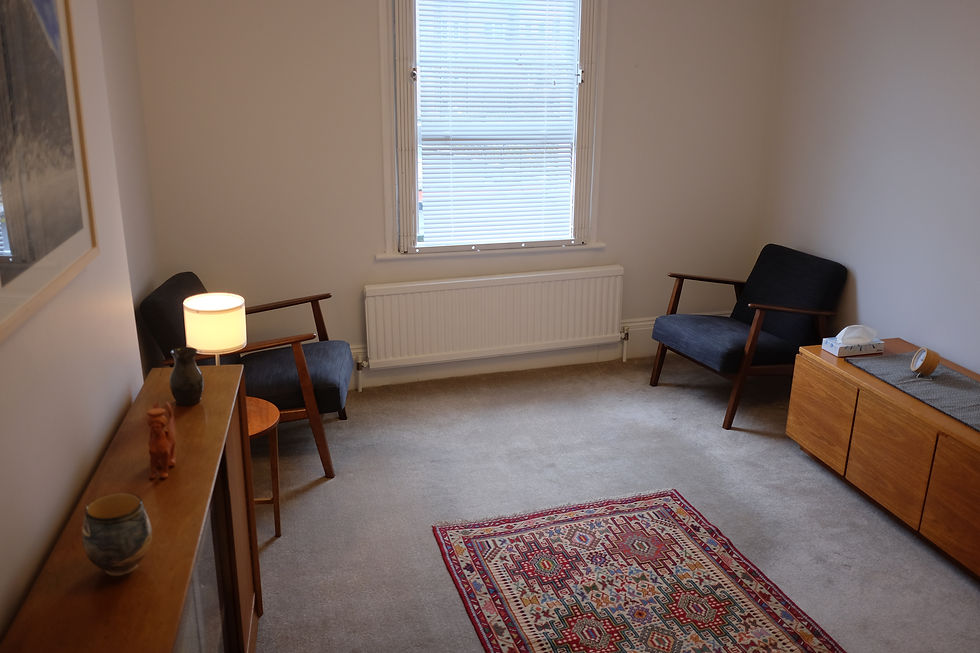
Clinical Psychologist & Psychodynamic Psychotherapist
Psychotherapy
"A person goes to therapy because of a symptom, a problem, as we call them, or an upset, disturbance. The question is not so much how to get rid of that as it is 'Why is this disturbance coming in my life? What does it want? What kind of a life have I got that it needs this disturbance to it?'"
– James Hillman
Psychological Consultation
"All sorrows can be borne if you put them into a story or tell a story about them." – Karen Blixen
You may feel unsure about how to make sense of what you are going through and what might help you. A psychological consultation is an opportunity for us to discuss your concerns, develop a psychological understanding of them together, and consider what support may be appropriate for you. This is partly a psychological assessment and partly a psychotherapeutic experience to determine how psychotherapy could be helpful to you. This initial meeting is 50 minutes. We may feel it would be important to meet a second time to complete this.
Following the consultation, it may be that we agree to begin meeting for psychotherapy or that I suggest an onwards referral. Sometimes a consultation can feel helpful enough as a standalone meeting to make sense of a particular concern or 'process' something. Please contact me to book a psychological consultation.
Psychotherapy
"To speak freely, with someone freely listening, is a radical act."
– Adam Phillips
You may be considering psychotherapy for a specific concern, or 'symptom', that you would like to address (e.g. anxiety, depression, relationship difficulties, etc.). Or you may have a specific question, or life transition, that needs attention. You may find you're repeating the same 'patterns' over and again. It may be that you have a general sense of uneasiness, meaninglessness, or a lack of playfulness in life. Or perhaps you want to get to know yourself more deeply and experience life more fully. Of course, you may also feel unsure about why exactly you'd like to talk to a psychotherapist, but still want to.
Psychotherapy proceeds as a conversation between two people who speak, and listen, to each other. One person (me, the psychotherapist) commits to the task of helping you to understand yourself. It begins with the idea that the ways in which we experience ourselves, others, and the world, are based on 'patterns' (of thinking, feeling, and behaving) that happen habitually and are often outside of our conscious awareness. These may have started out as ways of coping with anxiety and emotional pain and become relatively 'fixed', leaving other possibilities unimaginable, and the person feeling stuck, or even distressed. Psychotherapy is a place to bring what has previously been 'unthought' into mind. It is an opportunity to not only develop intellectual knowledge about oneself, but also to develop one's capacities as an emotional being, leaving one freer to have a deeper engagement with life. It is important to also note that, as this process unfolds, psychotherapy can sometimes feel challenging, as well as rewarding.
I offer both:
-
time-limited counselling and psychotherapy (agreeing a set number of sessions [usually 12, 16 or 24] to focus on a particular psychological concern or life event), and
-
open-ended (ongoing) psychotherapy (working in a more exploratory way, towards deeper, and longer lasting, change)
All sessions are weekly for 50 minutes.
Making a Beginning
To make a beginning with psychotherapy, you can contact me to arrange an initial psychological consultation meeting. We can arrange a brief telephone conversation beforehand, if you would like, to discuss whether a consultation might be suitable.
What I Don't Provide
I not provide medico-legal reports or prescribe psychiatric drugs.




My consulting room in Bromley, London
(click image to open)
What Can I Receive Help With?
I provide consultation and psychotherapy to adults experiencing the following*:
-
Addiction
-
Attention and hyperactivity difficulties ('ADHD')
-
ADHD assessment (visit southlondonadhd.co.uk)
-
Anger
-
Anxiety ('generalised anxiety', 'social anxiety')
-
Asperger's syndrome
-
Autism
-
Bereavement
-
Chronic pain
-
Complex trauma / 'personality disorder'
-
Depression / low mood
-
Dissociation
-
Emotional turmoil
-
Impulsivity
-
Life transitions
-
Marital and premarital difficulties
-
Obsessionality / ‘OCD’
-
Peer relationships
-
Relationship issues
-
Self-esteem
-
Self-harm
-
Sexual difficulties
-
Sexual abuse
-
Stress
-
Trauma and ‘post-traumatic’ stress
-
Unusual beliefs / ‘psychosis’
-
Voices and visions / ‘psychosis’
*You may have had your distress described by someone in different language / terminology than that used here. If you are unsure and would like to know if I may be able to help you please contact me.